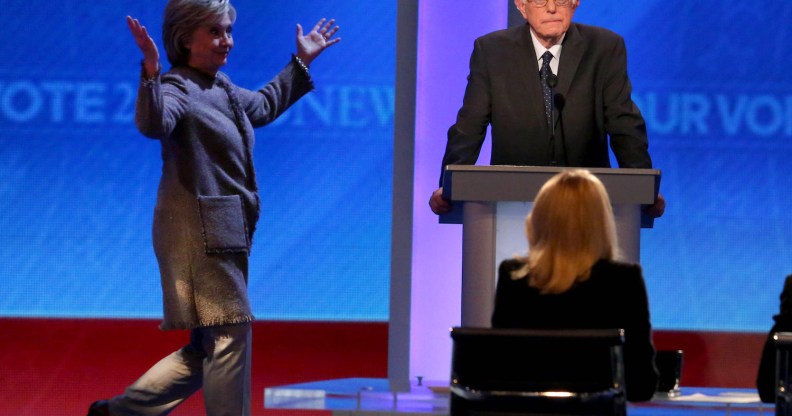Bernie Sanders: I don’t know what Hillary was talking about on the Reagans’ AIDS record

Bernie Sanders has criticised Hillary Clinton for a statement in which she paid tribute to the Reagans’ having started a ‘national conversation’ on AIDS.
Democratic Presidential hopeful Mrs Clinton on Friday retracted a statement praising the Reagans for starting a “national conversation” about AIDS.

Speaking at the Ronald Reagan Presidential Library as mourners flocked to pay respects to Mrs Reagan at her funeral, Mrs Clinton said: “It may be hard for your viewers to remember how difficult it was for people to talk about HIV/AIDS back in the 1980s.
RELATED: THIS FILM SHOWS THE CHILLING RESPONSE THE REAGANS GAVE TO THE AIDS CRISIS
“And because of both President Reagan and Mrs. Reagan, in particular Mrs. Reagan, we started a national conversation, when before nobody would talk about it, nobody wanted to do anything about it.”
She went on to praise Nancy Reagan for her “very effective, low-key advocacy.”
Speaking in an interview with CNN on Sunday, Sanders said: “I just don’t know what she was talking about.”
He added: “In fact, that was a very tragic moment in modern American history. There were many many people who were dying of AIDS, and in fact there was demand all over the country for President Reagan to start talking about this tragedy, and yet he refused to talk about it.”
Continuing, he added: “I’m glad [Clinton] apologised, but the truth is it was not President Reagan and Nancy Reagan who were leaders … quite the contrary … they didn’t get involved in it.”

Many have taken to social media to express outrage, with some suggesting Mrs Clinton was attempting to “rewrite history”.
Clinton later tweeted a statement from her official Twitter account which read: “While the Reagans were strong advocates for stem cell research and finding a cure for Alzheimer’s disease, I missspoke about their record on HIV and AIDS. For that, I’m sorry.”
Since, in a lengthy statement published on Medium, Mrs Clinton has acknowledged that she “said something inaccurate”, saying she “made a mistake, plain and simple”.

